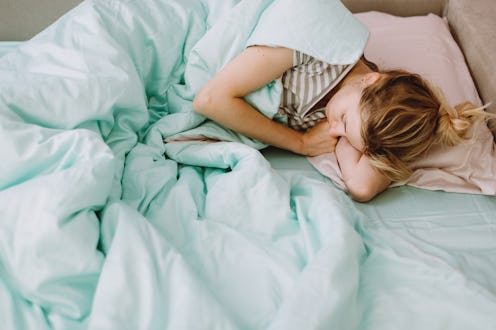Life
All The Ways White Noise Changes The Way You Sleep

If you find yourself tossing and turning at night due to annoying sounds, then you'll likely notice a big difference in your sleep with white noise humming away in the background instead. By flipping on a noise machine, fan, or using an app, it can mean finally falling asleep and staying asleep. And thus feeling a lot less groggy in the morning.
"White noise is essentially a mix of all the different frequencies of sound played at the same time," Katie Golde, a certified sleep science coach and head of sleep research at Mattress Clarity, tells Bustle. "Since it encompasses so many sounds, it has the power to mask disruptive noise, say a busy street, loud neighbors, snoring partner, etc., while you sleep."
If a car alarm goes off while you're snoozing, for instance, it'll jar you awake, even if you don't remember it. "Sleep involves multiple stages, and some of these stages involve lighter sleep in which it is easier to wake up," Jared Heathman, MD, a psychiatrist at Your Family Psychiatrist, tells Bustle. "Loud or uncommon noises are more likely to cause awakenings during light sleep. White [...] noise is particularly good at drowning out these other sounds so that we are more likely to stay asleep."
It also makes it more likely you'll be asleep long enough to get down into the deeper stages of sleep, which is necessary for your body to restore itself. "Getting the appropriate amount of deep sleep has many significant health benefits, such as more time for your body and mind to rest and recover, which makes you feel more rejuvenated the next day," Alesandra Woolley, a certified sleep science coach and executive editor of Mattress Advisor, tells Bustle.
White noise may even make it easier to sleep when traveling, as it's something you can use to drown out noise in crowded hotels, Woolley says, or if you find yourself in a noisy environment, like a busy city. If you typically aren't able to sleep in these locations, you might be surprised by how helpful white noise will be.
It is possible to go overboard, though. "The down-side of using white noise is that you can become reliant," Chelsie Rohrscheib, a sleep expert and member of the Sleep Cycle Institute, tells Bustle. "If there is ever a time when you no longer have access to the white noise sounds you're used to, you might find it even more difficult to fall asleep." So if you suddenly need white noise, that's your cue to take a break.
It can also be tempting to blast white noise into your ears in an effort to drown out every last sound. But according to Golde, "you'll want to turn the volume down to below 85 decibels to reach a safe long-term volume level," which is something you can even check by using a decibel tracker app on your phone. That way you'll get good rest, without experiencing any negative side effects.
White noise can be handy when trying to sleep, but it's also OK if you decide it isn't for you. This might happen if you are sensitive to sound or prefer silence, Golde says, and therefore find white noise to be too distracting. When that's the case, it'll have a negative impact on your sleep by being just as disruptive as a snoring partner or roaring traffic.
If you can't stand a static-y sound, or need perfect silence in order to doze off, ear plugs may be a better option. "This is another great way to block sound and it can be a simple and affordable method," Golde says. "There are a lot of options out there; foam, moldable wax, and silicone are all popular. Some people prefer disposable and some like pairs you can clean and reuse."
Experts also recommend hanging thick curtains to cover up windows and doors so noises don't sneak through, moving your bed to a quieter space, or using noise-canceling headphones to play relaxing music. But if you like the idea of using white noise, it might just mean getting better sleep, no matter how loud the world is around you.
Experts:
Katie Golde, certified sleep science coach and head of sleep research at Mattress Clarity
Jared Heathman, MD, psychiatrist at Your Family Psychiatrist
Alesandra Woolley, certified sleep science coach and executive editor of Mattress Advisor
Chelsie Rohrscheib, sleep expert and member of the Sleep Cycle Institute
This article was originally published on